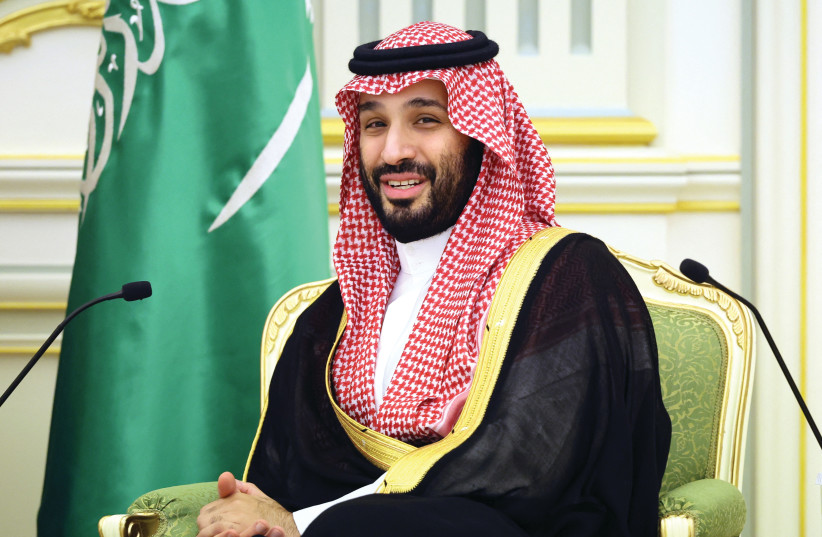Saudi normalization with Israel is dependent on an end to the Gaza war and Israel’s willingness to embark on the path to a two-state resolution to the conflict, US Secretary of State Antony Blinken told reporters in Tel Aviv on Wednesday night.
“When I saw the Crown Prince [Mohammed Bin Salman] in Saudi Arabia just a couple of days ago, he repeated to me his desire and determination to pursue normalization,” Blinken said as he referred to his visit to the Kingdom on Monday night as part of his weeklong trip to the region.
Bin Salman repeated that normalization required two things, Blinken said, “One, there needs to be calm in Gaza; two, there needs to be a clear and credible pathway to a Palestinian state.”
Blinken said, “It’s clear to me, from talking to many of the countries in the region, that they’re prepared to do things with and for Israel that they were never prepared to do in the past, including steps that would further address any security concerns it might have. And similarly, the United States is prepared to do that, too.”
He didn’t refer to the unusual statement the Saudi Arabian Foreign Ministry put out after the visit dismissing US claims that it was enough for Israel to commit to the process.

Saudi Arabia: normalization can only happen with Palestinian statehood
Normalization can only happen with recognition of Palestinian statehood on the pre-1967 lines, with east Jerusalem as the capital, the Saudi Foreign Ministry said.
Prime Minister Benjamin Netanyahu and his government have spoken of their opposition to Palestinian statehood even as they have sought diplomatic ties with Saudi Arabia as part of their normalization push for the region.
Before October 7, Israel had presumed that normalization was possible without Palestinian statehood but with other significant concessions to the Palestinians.
US President Joe Biden had hoped to finalize a security pact with Riyadh that also included normalization between Saudi Arabia and Israel.
Blinken recalled those efforts while in Tel Aviv. “We were, before October 7th, pursuing the possibility of normalization between Israel and Saudi Arabia.
“In fact, I was scheduled to come to Israel and Saudi Arabia – I believe it was on October 10th – to pursue that, and in particular, to focus on what we already knew back then was a necessary Palestinian component to any normalization agreement,” he stated.
“We remain determined as well to pursue a diplomatic path to a just and lasting peace, and security for all in the region, and notably for Israel,” he said.
This envisions, he said, “an Israel that’s fully integrated into the region, with normal relations with key countries, including Saudi Arabia, with firm guarantees for its security, alongside a concrete, time-bound, irreversible path to a Palestinian state living side by side in peace and security with Israel, with the necessary security assurances.”
In his discussion with Saudi, Qatari, Egyptian, Israeli, and Palestinian officials during his trip, Blinken said, he discussed the “substance and sequence of steps that all would need to take to make this path real.”
Blinken recalled that during his meeting Wednesday with Palestinian Authority President Mahmoud Abbas he spoke of steps the PA had to take to reform its governance.
According to the Palestine News Agency WAFA, Abbas in that meeting urged the US to unilaterally recognize Palestinian statehood and to support its acceptance as a full-fledged member of the United Nations, a move that requires UN Security Council approval. The US is one of five permanent council members with veto power.
In Jerusalem on Wednesday night, Netanyahu, who has long held that the normalization deal as his goal, dismissed the relevance of the Saudi statement, as he explained that October 7 has changed Israel’s reality.
An IDF victory over Hamas was not just an existential necessity but also a necessary component for all Israeli relations in the region including with Saudi Arabia, he said.
Israel’s enemies and foes are watching intently to see who wins and who loses, Israel or Hamas, Netanyahu explained.
“This test is taking place in Gaza. In the end, the true test is who wins.”
Israel can only make a deal with Saudi Arabia if it destroys Hamas, Netanyahu said.
“There won’t be a deal if we aren’t victorious against Hamas and if we are victorious you will see the circle of peace expand” to other regional countries. “Of this I have no doubt,” Netanyahu stated.
He added that public statements are not what matters in a negotiation but rather the closed-door conversations.
